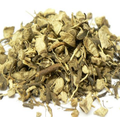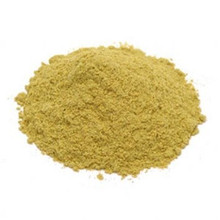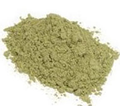 Loading... Please wait...
Loading... Please wait...- Home
- Bulk Herbs
- Herbs (C)
- Calendula Flower Powder
- Home
- Herbs - Organically Grown & Wild Crafted USA
- C-D
- Calendula Flower Powder
Product Description
Calendula Flower Powder
Also Known As - Calendula officinalis, pot marigold, Garden Marigold, Gold-Bloom, Holligold, Marigold, Marybud, Zergul.
Overview - Brilliant golden orange Calendula flowers have been used as a food, coloring agent for fabric and food (cheese), and have graced statues of Hindu deities in temples. The Genus, Calendula, contains about 20 different species of annual or perennial herbaceous plants and is native to the northern Mediterranean regions. The genus name is derived from the Latin word, “kalendae”, which means the first day of the month, probably referring to the fact that the flowers are in bloom at the start of most months in the year in their native regions. Although a common name of this plant is “Pot Marigold”, it is not related to the Tagetes or Marigold Genus. Calendula flower petals can be added as a flavoring to rice, grain dishes, salads and used as a replacement for Saffron.
Parts Used – The flowers and leaves.
Origin - USA Organically Grown - No pesticides or chemical soil additives used on our crops.
Preparations - Creams, teas, tinctures, infusions, compresses, and washes.
- Infusion: use 1 to 2 tsp. fresh or dried flowers with 1/2 cup water; steep for 5-10 minutes and strain. Take 1 tbsp. every hour.
- Juice: take 1 tsp. at a time, always freshly pressed.
- Tincture: to make, soak a handful of flowers in 1/2 qt. rectified alcohol (not rubbing alcohol) or whiskey for 5 to 6 weeks. A dose is 5-20 drops.
- Salve: boil 1 oz. dried flowers or leaves, or 1 tsp. fresh juice, with 1 oz. of lard.
- Tea: use 1 heaping tbsp. dried herb in 1 cup boiling water. One cup daily.
- Extract: mix 10 to 30 drops in liquid daily.
- Oil: apply oil or commercial preparation directly to affected area externally, once daily. Put on cotton swab and place in ear for earache.
Medicinal - There are many uses for Calendula, both topically and internally. One study of 254 radiation patients compared its efficacy to trolamine for treatment of dermatitis. The flower contains many different antioxidant groups including lutein, lycopene, beta-carotene, quercitin, rutin, and a host of others. One could see how the use of this flower in an extract or oil could benefit the skin, nervous system and mucous membranes in many ways. It is theorized in testing done on the plant extract that the constituents in Calendula promote the development of collagen structures in the skin and mucous membranes, yet more research is needed to validate this activity.
- It has been asserted that a Calendula flower, rubbed on the affected part, is an admirable remedy for the pain and swelling caused by the sting of a wasp or bee. A lotion made from the flowers is most useful for sprains and wounds, and a water distilled from them is good for inflamed and sore eyes. Calendula in powder form contributes to gut health, a strong immune system, heart health, brain health, improved mood, healthy sleep, and effective digestion.
- An infusion of the freshly-gathered flowers is employed in fevers, as it gently promotes perspiration and throws out any eruption - a decoction of the flowers is much in use in country districts to bring out smallpox and measles, in the same manner as Saffron. Marigold flowers are in demand for children's ailments.
Active Constituents - Antioxidants, Polysaccharides, Sterols, Volatile Oils
Other Uses - Calendula is often used as a less-expensive substitute for saffron, fresh or dried petals give subtle flavor and golden color to seafood, soups, stews, puddings, rice, and omelets. The dried petals, softened in hot milk, can be added to the batters of cakes, breads, and cookies. The fresh, tender young leaves are good in salads.
- Discourages Mexican bean beetles, nematodes, asparagus beetle, and other insects.
Precautions - Not for use during pregnancy and lactation.
Disclaimer - The information presented herein by Mountain Maus’ Remedies is intended for educational purposes only. These statements have not been evaluated by the FDA and are not intended to diagnose, cure, treat or prevent disease. Individual results may vary, and before using any supplements, it is always advisable to consult with your own health care provider.
















